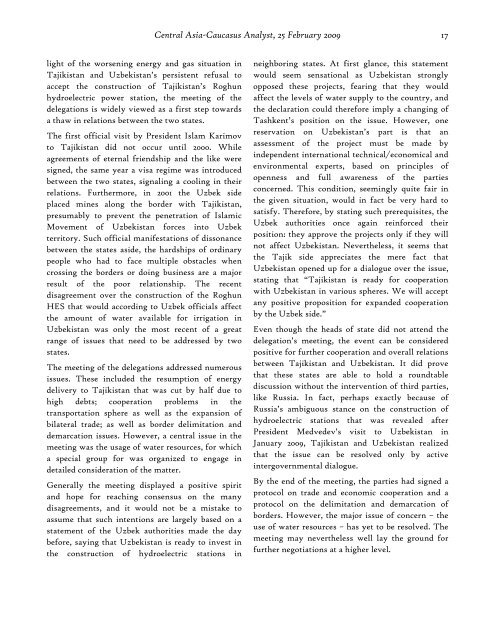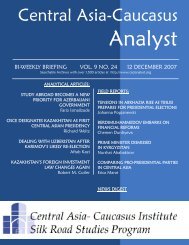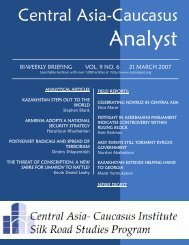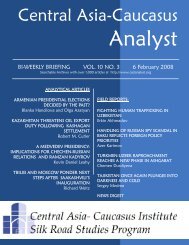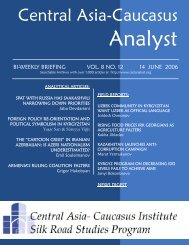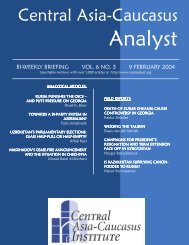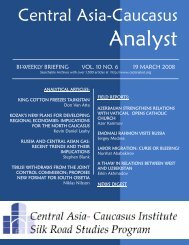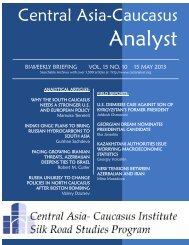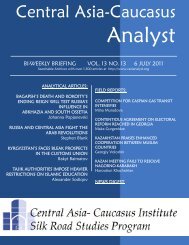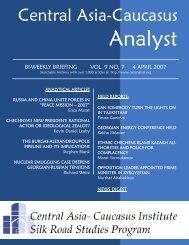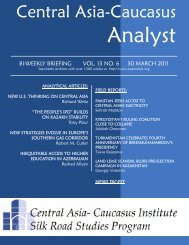Central Asia-Caucasus - The Central Asia-Caucasus Analyst
Central Asia-Caucasus - The Central Asia-Caucasus Analyst
Central Asia-Caucasus - The Central Asia-Caucasus Analyst
Create successful ePaper yourself
Turn your PDF publications into a flip-book with our unique Google optimized e-Paper software.
<strong>Central</strong> <strong>Asia</strong>-<strong>Caucasus</strong> <strong>Analyst</strong>, 25 February 2009 17<br />
light of the worsening energy and gas situation in<br />
Tajikistan and Uzbekistan’s persistent refusal to<br />
accept the construction of Tajikistan’s Roghun<br />
hydroelectric power station, the meeting of the<br />
delegations is widely viewed as a first step towards<br />
a thaw in relations between the two states.<br />
<strong>The</strong> first official visit by President Islam Karimov<br />
to Tajikistan did not occur until 2000. While<br />
agreements of eternal friendship and the like were<br />
signed, the same year a visa regime was introduced<br />
between the two states, signaling a cooling in their<br />
relations. Furthermore, in 2001 the Uzbek side<br />
placed mines along the border with Tajikistan,<br />
presumably to prevent the penetration of Islamic<br />
Movement of Uzbekistan forces into Uzbek<br />
territory. Such official manifestations of dissonance<br />
between the states aside, the hardships of ordinary<br />
people who had to face multiple obstacles when<br />
crossing the borders or doing business are a major<br />
result of the poor relationship. <strong>The</strong> recent<br />
disagreement over the construction of the Roghun<br />
HES that would according to Uzbek officials affect<br />
the amount of water available for irrigation in<br />
Uzbekistan was only the most recent of a great<br />
range of issues that need to be addressed by two<br />
states.<br />
<strong>The</strong> meeting of the delegations addressed numerous<br />
issues. <strong>The</strong>se included the resumption of energy<br />
delivery to Tajikistan that was cut by half due to<br />
high debts; cooperation problems in the<br />
transportation sphere as well as the expansion of<br />
bilateral trade; as well as border delimitation and<br />
demarcation issues. However, a central issue in the<br />
meeting was the usage of water resources, for which<br />
a special group for was organized to engage in<br />
detailed consideration of the matter.<br />
Generally the meeting displayed a positive spirit<br />
and hope for reaching consensus on the many<br />
disagreements, and it would not be a mistake to<br />
assume that such intentions are largely based on a<br />
statement of the Uzbek authorities made the day<br />
before, saying that Uzbekistan is ready to invest in<br />
the construction of hydroelectric stations in<br />
neighboring states. At first glance, this statement<br />
would seem sensational as Uzbekistan strongly<br />
opposed these projects, fearing that they would<br />
affect the levels of water supply to the country, and<br />
the declaration could therefore imply a changing of<br />
Tashkent’s position on the issue. However, one<br />
reservation on Uzbekistan’s part is that an<br />
assessment of the project must be made by<br />
independent international technical/economical and<br />
environmental experts, based on principles of<br />
openness and full awareness of the parties<br />
concerned. This condition, seemingly quite fair in<br />
the given situation, would in fact be very hard to<br />
satisfy. <strong>The</strong>refore, by stating such prerequisites, the<br />
Uzbek authorities once again reinforced their<br />
position: they approve the projects only if they will<br />
not affect Uzbekistan. Nevertheless, it seems that<br />
the Tajik side appreciates the mere fact that<br />
Uzbekistan opened up for a dialogue over the issue,<br />
stating that “Tajikistan is ready for cooperation<br />
with Uzbekistan in various spheres. We will accept<br />
any positive proposition for expanded cooperation<br />
by the Uzbek side.”<br />
Even though the heads of state did not attend the<br />
delegation’s meeting, the event can be considered<br />
positive for further cooperation and overall relations<br />
between Tajikistan and Uzbekistan. It did prove<br />
that these states are able to hold a roundtable<br />
discussion without the intervention of third parties,<br />
like Russia. In fact, perhaps exactly because of<br />
Russia’s ambiguous stance on the construction of<br />
hydroelectric stations that was revealed after<br />
President Medvedev’s visit to Uzbekistan in<br />
January 2009, Tajikistan and Uzbekistan realized<br />
that the issue can be resolved only by active<br />
intergovernmental dialogue.<br />
By the end of the meeting, the parties had signed a<br />
protocol on trade and economic cooperation and a<br />
protocol on the delimitation and demarcation of<br />
borders. However, the major issue of concern – the<br />
use of water resources – has yet to be resolved. <strong>The</strong><br />
meeting may nevertheless well lay the ground for<br />
further negotiations at a higher level.


